| |||||
| Decades: | |||||
|---|---|---|---|---|---|
| See also: | Other events of 1415 History of France • Timeline • Years | ||||
Events from the year 1415 in France .
| |||||
| Decades: | |||||
|---|---|---|---|---|---|
| See also: | Other events of 1415 History of France • Timeline • Years | ||||
Events from the year 1415 in France .

Year 1415 (MCDXV) was a common year starting on Tuesday of the Julian calendar.

Henry V is a 1944 British Technicolor epic film adaptation of William Shakespeare's play of the same title. The on-screen title is The Chronicle History of King Henry the Fifth with His Battell Fought at Agincourt in France. It stars Laurence Olivier, who also directed. The play was adapted for the screen by Olivier, Dallas Bower, and Alan Dent. The score is by William Walton.
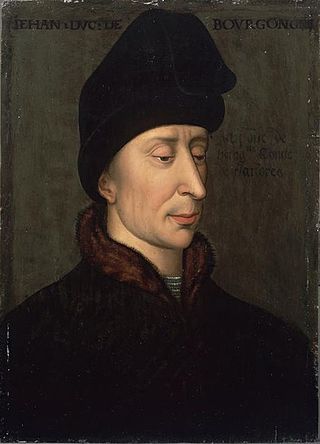
John I was a scion of the French royal family who ruled the Burgundian State from 1404 until his death in 1419. He played a key role in French national affairs during the early 15th century, particularly in the struggles to rule the country for the mentally ill King Charles VI, his cousin, and the Hundred Years' War with England. A rash, ruthless and unscrupulous politician, John murdered the King's brother, the Duke of Orléans, in an attempt to gain control of the government, which led to the eruption of the Armagnac–Burgundian Civil War in France and in turn culminated in his own assassination in 1419.
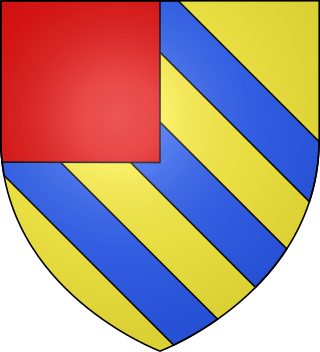
Several counts and then royal dukes of Alençon have figured in French history. The title has been awarded to a younger brother of the French sovereign.
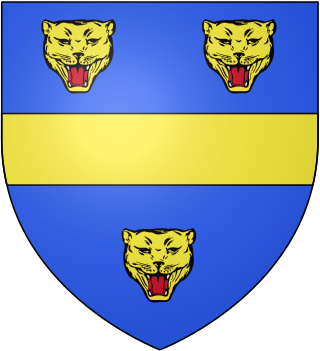
Michael de la Pole, 3rd Earl of Suffolk was an English nobleman, the eldest son of Michael de la Pole, 2nd Earl of Suffolk and Katherine de Stafford.

John I of Alençon, known as the Wise, was a French nobleman, killed at the Battle of Agincourt.

John II of Alençon was a French nobleman. He succeeded his father as Duke of Alençon and Count of Perche as a minor in 1415, after the latter's death at the Battle of Agincourt. He is best known as a general in the Last Phase of the Hundred Years' War and for his role as a comrade-in-arms of Joan of Arc.

Charles I d'Albret was the Lord of Albret and the Constable of France from 1402 until 1411, and again from 1413 until 1415. He was also the co-commander of the French army at the Battle of Agincourt where he was killed by the English forces led by King Henry V.

Phillip II, Count of Nevers was the youngest son of Philip the Bold and Margaret III of Flanders.

Marie of France was the sixth child and second daughter of John II of France and Bonne of Bohemia.

Bonne of Artois was Countess consort of Nevers by marriage to Philip II, Count of Nevers, which left her a widow at 18 or 19, and Duchess consort of Burgundy by marriage to Philip III, Duke of Burgundy, popularly known as Philip the Good. She served as regent of the County of Nevers during the minority of her son from 1415 until 1424.
Jean VII d'Harcourt was a French nobleman. He was Count of Harcourt, Count of Aumale, Viscount of Châtellerault, and Seigneur of Mézières, of Elbeuf, of Lillebone, of La Saussaye etc.
Events from the year 1814 in France.
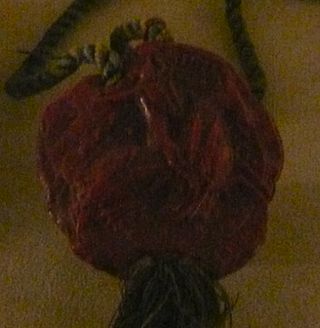
Robert I of Bar was Marquis of Pont-à-Mousson and Count and then Duke of Bar. He succeeded his elder brother Edward II of Bar as count in 1352. His parents were Henry IV of Bar and Yolande of Flanders.

Jeanne de Bar, suo jure Countess of Marle and Soissons, Dame d'Oisy, Viscountess of Meaux, and Countess of Saint-Pol, of Brienne, de Ligny, and Conversano was a noble French heiress and Sovereign Countess. She was the only child of Robert of Bar, Count of Marle and Soissons, Sire d'Oisy, who was killed at the Battle of Agincourt when she was a baby, leaving her the sole heiress to his titles and estates. In 1430, at the age of fifteen, Jeanne was one of the three women placed in charge of Joan of Arc when the latter was a prisoner in the castle of John II of Luxembourg, Count of Ligny, Jeanne's stepfather.

Anne of Armagnac, Dame d'Albret, Countess of Dreux was a French noblewoman and a member of the powerful Gascon Armagnac family which played a prominent role in French politics during the Hundred Years War and were the principal adversaries of the Burgundians throughout the Armagnac-Burgundian Civil War. Anne was the wife of Charles II d'Albret.
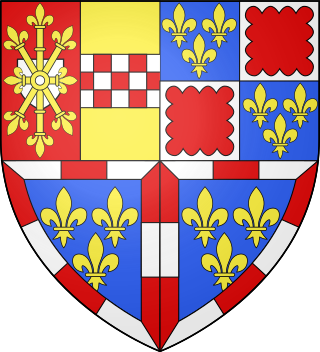
Marie d'Albret, Countess of Rethel, Countess of Nevers was the suo jure Countess of Rethel, a title which she inherited at the age of nine upon the death of her mother, Charlotte of Nevers, Sovereign Countess of Rethel, on 23 August 1500. She was the wife of Charles II of Cleves, Count of Nevers.
Jean I de Croÿ, Seigneur of Croÿ et d'Araines, Baron of Renty and of Seneghem, was the founder of the House of Croÿ.
Jean de Montagu or Jean de Montaigu, was a royal secretary and pupil to Charles V, and subsequently an administrator and advisor to Charles VI of France, who became a leading figure in France during the early 15th Century.
Events from the year 1401 in France